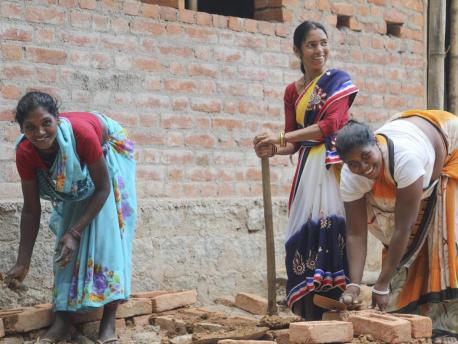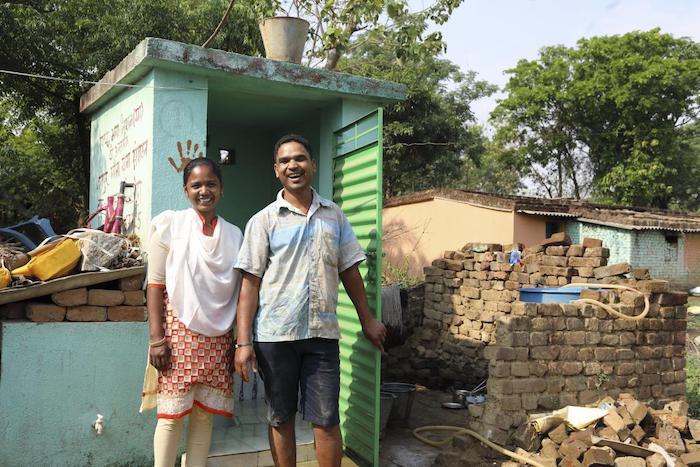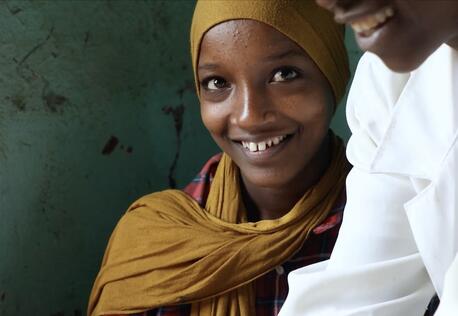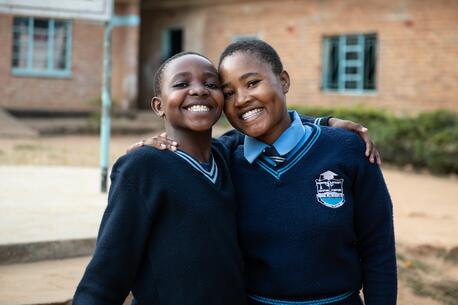
Building Toilets and Educating Girls About Menstruation In India
Trained as masons for a sanitation project, women in Jharkhand are leveraging their skills to change the conversation about gender roles and girls' futures.
UNICEF and partners are working tirelessly all over the world to save and protect children.
JHARKHAND, INDIA — What would you do if once a month, for five days, you were banned from socializing with your friends? From cooking, playing sports or going to school? From sleeping on beds or going outside at all?
In many parts of India, this is a reality for girls when they're menstruating. There is a common belief that menstrual blood is impure, and everday activities are restricted as a result. The taboo of menstruation also means that many girls don't learn about their periods or menstrual hygiene at home or in school.
Apart from being unhealthy and unfair, these restrictions reinforce gender inequity and exclusion — further disempowering women and girls.
I was not confident to go outside during my period. I felt inferior because of the traditional view that menstruation is a dirty thing.
The Indian state of Jharkhand is one of the areas where these misconceptions about menstruation are widespread. A 2013 UNICEF study found that the majority of girls reported that their mothers imposed restrictions on them when they were menstruating. Eighty percent didn't know the importance of washing menstrual cloths.
But lately, these beliefs and behaviors are starting the change, thanks in part to movements started by women locally, on the heels of a nationwide sanitation initiative to end open defecation by October 2019. When there were not enough skilled builders in Jharkhand to construct new toilets, the government started a program to train women as rani mistri (female masons).
The UNICEF-supported program not only helped Jharkhand become open defecation free, it also empowered more than 55,000 women who are using their newfound economic freedom to lift up the next generation of girls.

Raimuni, 28, stands with her husband outside the toilet she constructed outside the family home. Since becoming a female mason, she has helped change the conversation around menstruation in her town. © UNICEF India/2019/Bhardwaj
A crusader for sanitation
Raimuni, 28, lives in Jharkhand with her husband and daughter. Although she went to school before getting married, she had never worked outside of the home until she trained to become a rani mistri. This was due, in part, to menstruation.
"I was not confident to go outside during my period," she says. "I felt inferior because of the traditional view that menstruation is a dirty thing."
Driven by the goal of making her state open defecation free, Raimuni took an intensive training course to learn how to construct toilets and became a skilled rani mistri, starting with her own house.
When she was promoted to master trainer and became a leader of a self-help group, she felt that it was equally important to raise awareness on menstrual health. She gathered a group of rani mistris and started weekly discussions on menstrual hygiene management.
They taught parents in the community about using safe absorbents and sanitary cloths. Before, many girls and women used the same cloths over and over, without understanding how to properly clean them. The group also worked to bust myths about periods and encourage girls and women to go to school and work, even while menstruating.
"I am not only a proud rani mistri, but also an active contributor in shaping a healthy future for my daughter and women in society," says Raimuni. "If they have access to toilets and information on good health and hygiene practices, they will be able to lead healthier lives."

Alka Minj stands with her daughters outside a toilet she built in Jharkhand, India. She is paying for her daughters' education using her income as a mason. © UNICEF India/2019/Bhardwaj
Opportunities for economic empowerment
For other women, training to become rani mistris has helped them gain financial freedom.
Coming from a water-scarce village with low agricultural productivity, Alka Minj used her rani mistri training as a gateway to more lucrative job opportunities. When she worked as a farmer, her income had been meager and seasonal. Her new source of income as a mason allowed her to become self-sufficient in taking care of her children's education.
Toilet construction has doubled my income," she says. "I encourage every other women to do something for her own unique identity." Alka is proud to have challenged the gender-based barriers that exist in her community, and hopes to share these lessons about perseverance and agency with her daughters.
Like Alka, Gidlli, 45, was able to use her rani mistri training to advance her daughters' opportunities. "Earlier, I could never imagine educating my seven children with subsistence living," she says. "Earnings from constructing toilets has helped me support my daughter in pursuing her postgraduate studies."
Over the past two years, the state of Jharkhand has not only trained more than 55,000 women to become toilet masons, providing them with the skills to expand their expertise to other construction opportunities, but also invested in menstrual hygiene management counseling in schools to help adolescent girls and their peers overcome the stigma surrounding menstruation. The Government went on the develop a state-level menstrual hygiene management road map to help reach Sustainable Development Goal 5 — achieving gender equality and the empowerment of women and girls.
Top photo: To end open defecation in India's Jharkhand state, the government trained women to build toilets. The women used their newfound economic independence to bust menstruation myths, raise awareness of menstrual hygiene management and encourage girls to stay in school. © UNICEF India/2019/Bhardwaj
HOW TO HELP
There are many ways to make a difference
War, famine, poverty, natural disasters — threats to the world's children keep coming. But UNICEF won't stop working to keep children healthy and safe.
UNICEF works in over 190 countries and territories — more places than any other children's organization. UNICEF has the world's largest humanitarian warehouse and, when disaster strikes, can get supplies almost anywhere within 72 hours. Constantly innovating, always advocating for a better world for children, UNICEF works to ensure that every child can grow up healthy, educated, protected and respected.
Would you like to help give all children the opportunity to reach their full potential? There are many ways to get involved.





